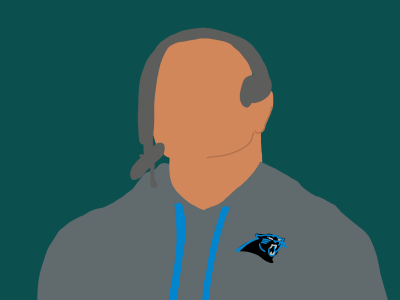When the Carolina Panthers fired head coach Matt Rhule after a 1-4 start, interim head coach Steve Wilks led the Panthers to a respectable 6-6 record to finish the season.
A coach’s success should be measured by how well his team performs relative to the talent on the roster. Pro Football Focus’s player grades ranked the Panthers 28th out of 32 teams.
Given the lack of talent on the Panthers roster, Steve Wilks performed a miracle by putting his team in a position to compete for a playoff berth late into the season. The Panthers had a fourth-quarter lead against Tom Brady and the Buccaneers in Week 17, which was the de facto NFC South division title game. Though the Panthers lost that game, the ability to dominate the Buccaneers once at home as well as nearly beating them on the road, showed the grit the team developed under Wilks.

His reward? Being passed over for former Colts head coach Frank Reich, a white man. The same Reich whom the Colts fired in 2022 after a 3-5-1 start. The same one who led the Colts to just one playoff win in five seasons.
Reich got the job because of his offensive focus, according to Panthers owner David Tepper. Tepper said the trend toward offense in the NFL is “never going to end.”
Reich supporters might point to his crafting the one great season of Carson Wentz’s career when he was the Philadelphia Eagles’ offensive coordinator. Those supporters might want to ignore Reich’s most recent coaching performance alongside Wentz in which he threw for 27 touchdowns to only 7 interceptions, yet only managed about 200 passing yards per game and a 9-8 record.
On the surface, Reich’s coaching background and record of occasional success seems to merit the hire. He’s an offensive-minded coach for an increasingly offense-centric league.
As a fan, I was happy when my Minnesota Vikings hired Kevin O’Connell, an offensive-minded coach who is white, as the head coach last year. Despite the interior offensive line and quarterback limitations, he was able to lead one of the league’s most explosive offenses to a 13-4 record.
But the Vikings situation at the end of last season is not comparable to the Panthers situation right now. The Vikings had no interim head coach who had shown promise. The Panthers did.
Furthermore, even if the Panthers had won the NFC South, I am still uncertain that Wilks would have gotten the head coaching job.
All of the above sends a clear message to current and aspiring Black coaches in the NFL: your winning will not necessarily reward you. The opposite message is sent to white head coaches: your losing will not necessarily be held against you.
The racial dimension is stark in a league in which about 60 percent of players are Black yet only three of the 32 head coaches are.
Another obvious and recent example of the disparate treatment of Black and white head coaches comes from the Los Angeles Chargers. The Chargers are led by white, defensive-minded head coach Brandon Staley. Staley’s team blew a 27-0 lead against the Jacksonville Jaguars in the first round of this year’s playoffs.
That kind of choke job is almost always a fireable offense, especially considering the primary reason for the blown lead was surrendering 24 points in the second half. But for white head coaches, that kind of blunder is survivable. This is true for Staley, who still has his job despite the fact that he has no playoff wins or prior success.
Former Chargers head coach Anthony Lynn, a Black man, was not given as much leeway when the Chargers decided to fire him after two disappointing seasons in 2019 and 2020. They fired him despite the fact that Lynn had led the 2018 Chargers to a 12-4 record and a road playoff victory before falling to the eventual Super Bowl champion New England Patriots in the divisional round.
The pattern of unfair treatment toward Black NFL head coaches caused Brian Flores to file a racial discrimination lawsuit against the NFL. Wilks joined that lawsuit and has previously alleged unfair treatment by NFL front offices.
The Reich hire may very well be held up as another example of racial bias in the NFL during the Flores lawsuit.
Coaching, above all things, is about leadership and understanding how to connect with players to get the best out of them — especially when there is limited talent from which to draw. Wilks showed his ability to do this, despite taking over a team in shambles in Week 6 without the benefit of training camp to help prepare his players with his own coaching philosophy and schemes.
After how the Panthers organization treated Wilks, I hope Wilks gets the head coaching job he deserves somewhere else and shows Carolina the mistake they made by opting for white mediocrity over Black success.






























































































































graliontorile • Feb 7, 2023 at 7:34 pm
Hello.This post was really interesting, especially since I was browsing for thoughts on this subject last Saturday.